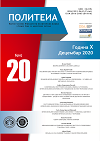Remembering Work: The ‘Čajavec’ Company Workers after Privatisation
Remembering Work: The ‘Čajavec’ Company Workers after Privatisation
Author(s): Anđela PepićSubject(s): Economic history, Labor relations, Economic policy, Government/Political systems, Post-Communist Transformation
Published by: Fakultet političkih nauka Univerziteta u Banjoj Luci
Keywords: post-socialist transformation; privatisation; workers; Čajavec;
Summary/Abstract: The working class was, at least formally, a formative basis of the former Socialist Federative Republic of Yugoslavia (SFRY). The transformation of the system from the Communist to the capitalistic one led to its alienation, poverty, and social exclusion. This transformation, as part of the neoliberal globalisation, occurred through the introduction of the so-called ‘shock therapy’ measures: liberalisation, privatisation, and stabilisation. Large industrial complexes and leading stateowned companies in the SFRY were the subject of, often dubious, privatisation processes. Through such processes, workers, who were once owners and motors of companies they worked at, are now stripped of the ownership and the opportunity to work at the same companies. The majority of research on post-Communist economic transformation focuses on changes to the system, on economic aspects of privatisation processes, and on introduction of market economy. Yet, there are few research focusing on the privatisation and transformation from a workers’ perspective. This paper attempts to fill in this gap by providing a different angle to the current studies of transformation of the SFRY and its successor states. Through interviews with former workers of privatised and/or closed factories and industrial complexes (using the local company of ‘Rudi Čajavec’ as an example), the research presented in this paper analyses workers’ attitudes and sentiments towards the labour in the Communist Yugoslavia and the labour today, as well as towards the privatisation processes accompanying the latter.The research gives a voice to the workers, and, by looking at the past, gives a worker-centred approach to imagining labour in the future.
Journal: Politeia - Naučni časopis Fakulteta političkih nauka u Banjoj Luci za društvena pitanja
- Issue Year: 10/2020
- Issue No: 20
- Page Range: 171-180
- Page Count: 10
- Language: English

